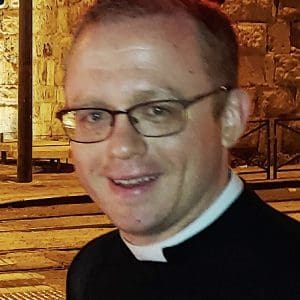During this Advent season, there are a lot of external comings and goings that can make us tired and drowsy – parties, shopping, concerts, watching movies, seeing Santa Claus with the kids, seeing family, decorating. We hear St. Paul urge us this First Sunday of Advent to wake up amidst the drowsiness of these comings and goings in our second reading:
You know the time; it is the hour now for you to awake from sleep. For our salvation is nearer now than when we first believed; the night is advanced, the day is at hand. Let us then throw off the works of darkness and put on the armor of light; let us conduct ourselves properly as in the day, not in orgies and drunkenness, not in promiscuity and lust, not in rivalry and jealousy. But put on the Lord Jesus Christ, and make no provision for the desires of the flesh. (Romans 13:11-14)
Saint Thomas Aquinas notes that St. Paul refers here to “the sleep of guilt” for our sins (Cf. Eph 5:14) and “the sleep of negligence” through sloth (Cf. Prov 6:9) (Commentary on Romans 13:11-14, CL 13, L 3, n. 1062) Saint John Newman points out that the sleep that St. Paul speaks of is “a state of insensibility to things as they really are in God’s sight,” and warns us about the danger it poses to us:
When we are asleep, we are absent from this world’s action, as if we were no longer concerned in it. It goes on without us, or, if our rest be broken, and we have some slight notion of people and occurrences about us, if we hear a voice or a sentence, and see a face, yet we are unable to catch these external objects justly and truly; we make them part of our dreams, and pervert them till they have scarcely a resemblance to what they really are; and such is the state of men as regards religious truth.” (Parochial and Plain Sermons, n. 5 – “Self Denial and the Test of Religious Earnestness.”)
This spiritual sleep can also mean being distracted, anxious, disassociated, and wounded which blinds and deadens me to the presence of God both before me and abiding within me. So often we are tempted through sin and desolation towards a spiritual gluttony. We can notice a hunger and desire in our hearts for something more. When we cannot fill it in a comfortable and easy way, we start looking to fill it with merely passing earthly things, concerns, delights, and my own understanding. This sleep that distracts and blinds my heart ultimately leads to doubt, despair, and narcissism or even to the idolatry of sin. It is ultimately the main obstacle, or distraction that binds and blinds me from hearing and seeing the way that Jesus is speaking to me and approaching me this Advent season.
Our Lord Jesus himself reminds us not to fall asleep: “Stay awake! For you do not know on which day your Lord will come. Be sure of this: if the master of the house had known the hour of night when the thief was coming, he would have stayed awake and not let his house be broken into. So too, you also must be prepared, for at an hour you do not expect, the Son of Man will come.” (Matt 24:42-44)
This then begs the question, how will Jesus come to me this Advent season? The season of Advent is when the Church calls us to prepare for the coming of Jesus in three ways. We reflect for the first two weeks of Advent on the second and final coming of Jesus in glory “when we will come to judge the living and the dead.” We then close out Advent by prayerfully preparing and remembering his first coming in humility at Christmas with his birth as a baby boy in the manger at Bethlehem, uniting our frail human nature with his glorious divine nature. However, various saints throughout the Church’s history, such as Saint Bernard of Clairvaux (Sermon 5, In Adventu Domini, 1-3: Opera Omnia, Edit. Cisterc. 4 {1966}, 188-190. Taken from the Office of Readings, Wednesday of the First Week of Advent, Liturgy of the Hours, Vol 1), Saint John of the Cross (Spiritual Canticle, 39, 3-4), and Saint Thomas Aquinas (Commentary on Matthew 24:42-51 C 24, L 4, n 1996) speak of a third and intermediate coming of Jesus between his first and second coming that we should also be focusing upon during the Advent season. This third coming is known as the coming of Jesus in mystery. It occurs in His Eucharistic presence, the silence of prayer, and in the joys and trials of the present moment of life with various people and events that I often overlook.
This first proper focus on the coming of Jesus in mystery then helps me to be alert and watchful for both his coming at Christmas and at the end of time by allowing me to focus first on his presence with me here and now. This awareness of His coming to me in mystery will enable me to be grounded in a way that lets me find him in the external comings and goings that gives me joy and a receptivity towards His loving presence whenever Jesus comes to me. This is so that I can abide in the healing and salvation that he offers me here and now as well as share it with others, most especially those whom I overlook or find difficult to love. Saint Therese of Lisieux also reminds us in relation to Jesus’ coming in the Eucharist and in Advent, “Our Lord does not come down from Heaven every day to lie just in a golden ciborium. He comes to find another heaven which is infinitely dearer to Him -the heaven of our hearts and souls, temples of the Blessed Trinity.” (Story of a Soul)
And so we begin this Advent season by praying the great prayer of Advent “O Come, O Come, Emmanuel and ransomed captive Israel that mourns in lowly exile here, until the Son of God appears.” May this cry of the heart ever root us in our daily comings and goings in Jesus’ presence and to put him on anew in our hearts and lives this Advent season through turning away from the bondage and distraction of sin by making a daily commitment to mental prayer, taking advantage of the Sacrament of Confession as well as frequent and reverent reception of Jesus in the Eucharist. May our hearts become the new manger by which he can abide in and rest in us so that the great truth, promise, and prayer may be realized in us and the entire Church anew as we sing at the end of O Little Town of Bethlehem when Christmas comes, “O Jesus Child of Bethlehem, descend to us, we pray, cast out our sin and enter in, be born in us today. We hear the Christmas angels the great glad tidings tell; O come to us, abide with us, our Lord Emmanuel!”
Image courtesy of Unsplash.





